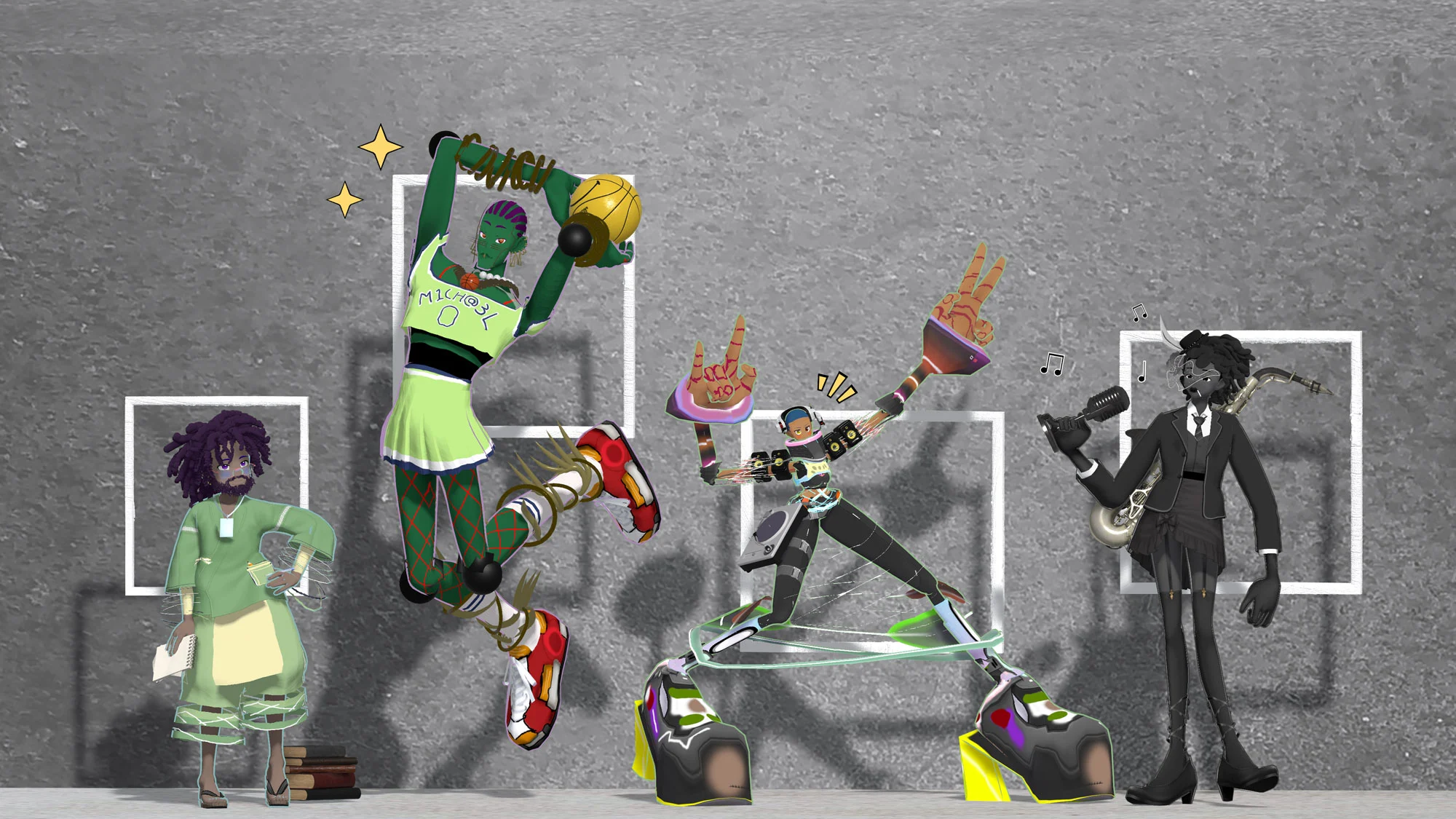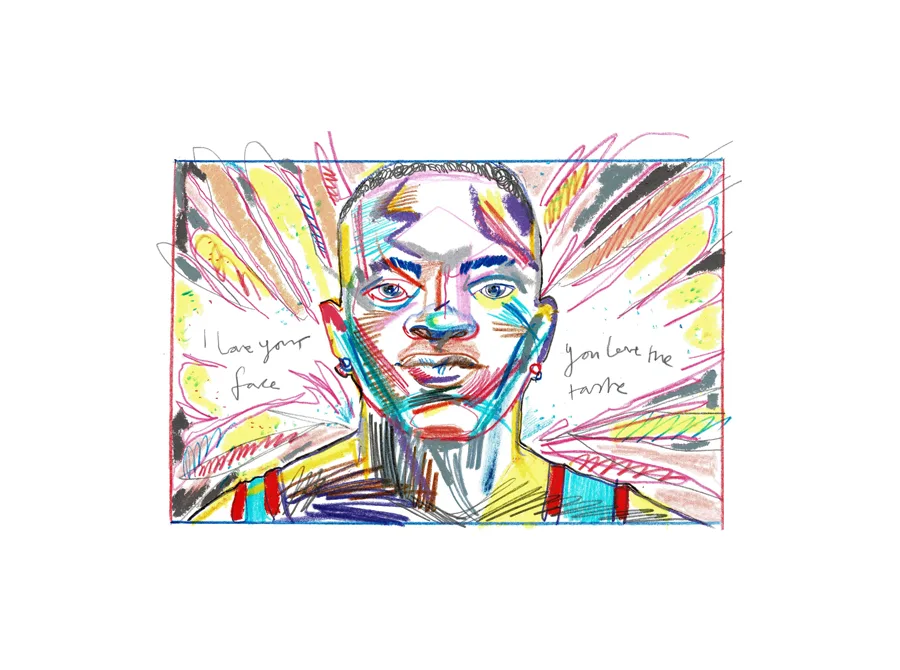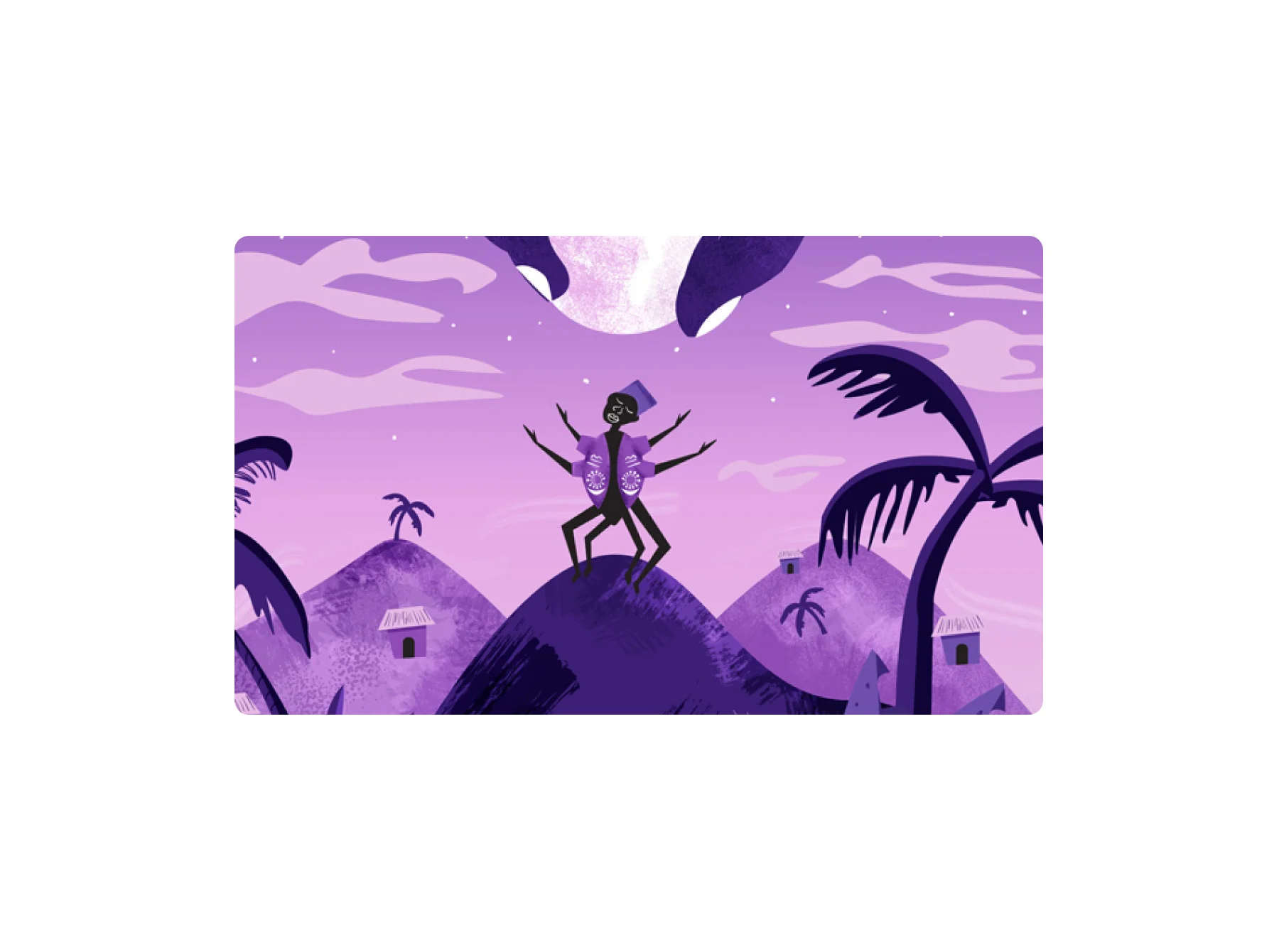

The metaverse has carved a path in gaming, art, and fashion. However, the average consumer's understanding of the metaverse probably comes from Meta founder Mark Zuckerberg's exciting promise of adding legs to the floating torsos in virtual reality. There are multiple ways Black-led media organizations can utilize it such as through events and education. But how can they overcome barriers often faced in the real world? White supremacy and racism are already infiltrating the space. And is the metaverse even relevant enough in its current form to be included in digital news media?
As part of our collaboration with A Vibe Called Tech, Williesha Morris spoke to three Black journalists about defining the metaverse and their perspective on this still-growing area that makes up Web 3.0.
Artwork by Serwah Attafuah.
Webster's dictionary's definition of the metaverse feels a bit cold and disconnected: "computing: a persistent virtual environment that allows access to and interoperability of multiple individual virtual realities." There's no indication of community or cooperation. The word itself was coined by sci-fi novelist Neal Stephenson in his 1992 novel, “Snow Crash”, to describe a virtual world outside of dystopian Los Angeles, California.
But in an interview with millennial-facing photography magazine Poppn’s editor-in-chief, Sarah Sharp defines the metaverse with the community in mind: "It's a virtual community, on the internet, that people can come together [in] and create experiences," she says.
Ashanti Maya Martin is the general manager of WURD Radio, a Philadelphia-based independent Black radio station. She describes the metaverse fairly simply as "Roblox for adults." Roblox is an online gaming platform and community aimed at young people. "[the metaverse is] a place where we connect with each other except using avatars," Martin says. WURD Radio isn't currently focusing on the metaverse. "We're really just trying to increase our reach over traditional digital channels, so that's where a lot of our energy or resources are," she continues. "Our listeners probably won't be on the metaverse because our listeners tend to be 55 and over. One of the things that we must do as a media company is to diversify our audience and attract younger audience members just for the preservation of our station."
Meanwhile, tech journalism has already declared the metaverse as "dead" and irrelevant to people in its current form. The technological quality needs to be higher to be viable for the average person. According to a survey by Morning Consult, many people need to see or read more about the metaverse. "Whether or not the metaverse is relevant to the Black media depends on the medium you're referencing and who you're having the conversation with," says Philadelphia-based journalist Denise Clay-Murray. "The people I deal with in the Black media are older folks who barely recognize the need for a working website and social media presence,” she says. “To them, the concept of a metaverse is something that 'the white boys' might find important, but Black people have other things to worry about."
The majority of “big tech” companies are majority white controlled.
However, much like how our reading and viewing habits changed during the early years of the internet, our current low interest in the metaverse might change,. As a young reporter, Martin thought, "The Internet? People are never going to want to read all their news on the Internet. But then, it actually did happen."
Clay-Murray said "to younger publishers, the metaverse is very important. In fact, it's so important that the technological end is their main focus, which isn't good either because it keeps older potential customers from taking part in their product. At some point, both sides need to realize that to best serve the community, that divide needs to go away."
"When there's any sort of money involved, it's absolutely relevant," Sharp said. A recent Bloomberg report estimates companies will invest more than $800 billion into the metaverse by 2024. With this much investment, media companies are contemplating what exactly to do with this Web 3.0 concept. The Morning Consult survey indicated that consumers are most interested in using the metaverse for entertainment. For example, Meta collaborated with Black creators during Black History Month last year to create virtual art experiences. In fact, there are multiple ways Black media can experiment with the metaverse: to entertain, educate and expand people's understanding of all manner of subjects.
"I could definitely see us experimenting with events in the metaverse," Martin says. Several companies, including video game Fortnite and consulting firm Deloitte have incorporated events into their platforms. In November 2020, Roblox hosted Lil Nas X and Montero Lamar Hill for a two-day concert event seen by 33 million people.
Meanwhile, media organizations are able to host virtual town halls, debates, or Q&As in the metaverse. Networking events can be held virtually during employment fairs or issue-based conferences. These spaces can be created as safe areas for Black people to communicate, share ideas and collaborate on creative projects. Subscribers can go behind the scenes using virtual or augmented reality with tours of the office. Augmented and virtual reality can be incorporated into the travel section of a media company and give readers an immersive experience in a locale. This is similar to how Morehouse College experiments with VR to teach the "History of the African Diaspora Since 1800." Students can experience the 1963 March for Jobs and Freedom in Washington, D.C., or walk with the "Little Rock Nine" as they integrate into a white school in Arkansas.
The Tribeca Film Festival collaborated with Black researcher Dr. Courtney Cogburn in the "1000 Cut Journey," where attendees can virtually walk in the shoes of a Black man to highlight the impact of racism in his life. Similarly, Black media organizations can collaborate on stories that span different issues or regions and be accessed in the metaverse to enhance digital content, such as video documentaries.
The lofty ideals of the metaverse are that it’s a virtual space where everyone is equal and not held back by government oversight or private industry.
Publications can offer non-fungible tokens (NFTs) of special art or content exclusive to subscribers. Internally, Black media companies can use the metaverse to integrate real and virtual educational opportunities, training, and collaboration more seamlessly. This can include pitch meetings but also internships, where students who don't have the means to travel can experience the newsroom, get training and shadow professional journalists virtually.
Several issues with the metaverse could impede growth within Black media. Sharp says the metaverse is too "muddy" and confusing to know exactly how it will positively contribute to Black media. "People aren't really sure how to get involved in it, at least in my community the artists are very hesitant about the metaverse," Sharp says. That hesitancy comes from some of the same issues that face the Black community in the real world: appropriation, misuse, and financial discrimination. "They don't want their work to be taken advantage of having put so much time and energy into it," she continues. "They don't want to put something in the metaverse and then it's stolen. That's a really big deal in the community right now, people stealing other people's work."
Whoever controls the metaverse controls the assets and the money. Recently, fashion brand Hermes won a lawsuit claiming their trademark copyright was infringed by a company using an NFT depicting one of their purses. This is at least one positive sign that artists can be rewarded for their original work.
Clay-Murray understands the metaverse is to communicate with each other in new ways, but face-to-face communication is still superior and has been decimated by the internet. We're already too disconnected from each other and the metaverse could exacerbate this issue.
"There's too much of an emphasis on the technical and not enough on the human side in how it's currently practiced," she says.
Black media companies are often underfunded and under-resourced and will encounter obstacles in monetizing the metaverse. Many people are struggling to make ends meet and often don't have the expendable income to afford a newspaper or magazine subscription, let alone a pricey VR headset. For example, the Meta Quest 2 starts at $399.
There's other disheartening news for Black media and the metaverse. Rare NFTs with art depicting darker skin tones have sold for less than the more common light-skinned NFTs. Data shows that AI algorithms have embedded racist and sexist biases. We live in a world where traditional media companies prep videos of unarmed police violence against Black people like the season premiere of a new sitcom. What's more, online arguments have real-world consequences. Clay-Murray says the gun violence crisis in Philly has "been punctuated by disputes that have started online before being settled terrestrially."
She does, however, hope that the metaverse is used to "showcase what's going on in the community so that we fix what we need fixing." Black trauma and pain should not be showcased anywhere, especially in the metaverse.
The main problem with the metaverse is that media attention is primarily focused on billion-dollar multinational companies like Microsoft and Facebook.
The main problem with the metaverse is that media attention is primarily focused on billion-dollar multinational companies like Microsoft and Facebook. The majority of “big tech” companies are majority white controlled. Black and brown people, and the media organizations they run, aren't centered in the planning and building of this virtual world. White people control the research, funding, and profits.
"The biggest potential for harm, I would think, is Black media being shut out," Martin says. "Much in the way that the internet started out as a lot of different places and areas and networks to go and join. And now it just feels like Google and Facebook." She hopes the metaverse isn't "co-opted by big tech and [Black media] is allowed to create our communities."
The most positive aspect of the metaverse is that this is a burgeoning area. The lofty ideals of the metaverse are that it's a virtual space where everyone is equal and not held back by government oversight or private industry. For now, Black media of any size or origin can realize this equality. There's plenty of opportunity to realize potential gains in Black media companies. Black-led tech companies already are creating a future where the blockchain builds Black wealth within a decentralized virtual currency system.
The incredible resiliency and creativity of Black people have changed the way we look at food, music, sports, fashion, and nearly every other aspect of culture. There's no telling how Black media can incorporate and use the metaverse to revolutionize the world. If they can hurdle the issues that come up with anything involving Black culture—namely, racism and whitewashing—anything is possible.





